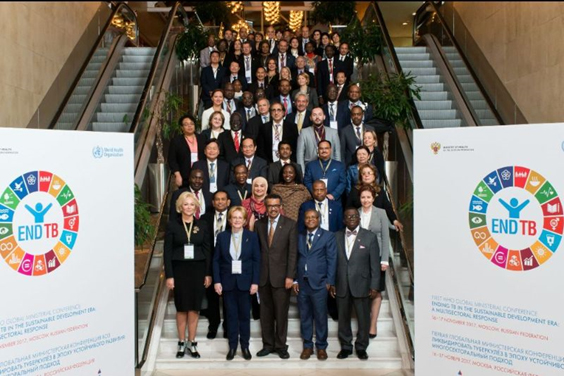
Exactly two years ago, 80 Ministers and other leaders along with partners and stakeholders from across 120 countries came together at the first-ever WHO Global Ministerial Conference on Ending TB in Moscow, and committed to take urgent action to end TB. Jointly organized by WHO and the Russian Federation, the conference put the first global spotlight on the need to accelerate the response to end TB and paved the way for the UN General Assembly high-level meeting on TB, where the issue was raised to the level of Heads of State and Government.
Today, as we mark two years since this landmark, let us remind ourselves of the Moscow Declaration to End TB and the commitments and call to action made in four broad areas:
- Advancing the TB response within the SDG agenda, by moving rapidly to achieve universal health coverage by strengthening health systems and improving access to people-centered TB prevention and care, ensuring no one is left behind.
- Ensuring Sufficient and Sustainable Financing through increased domestic and international investments to close gaps in implementation and research.
- Pursuing Science, Research and Innovation to advance the development of new tools to diagnose, treat, and prevent TB.
- Developing a Multisectoral Accountability Framework to track and review progress on ending TB, including multisectoral approaches.
Key progress
The past two years have seen unparalleled attention to the fight to end TB, including beyond the health sector. Countries and regions are currently in the process of implementing the commitments made in the Moscow Declaration and the UN high-level meeting on TB. WHO has been working closely with countries, partners and civil society to ensure adequate support and to keep the high-level spotlight focused on ending TB both at the national and global level. A sign of progress was highlighted in the recently launched WHO Global TB Report. WHO announced that more people received life-saving treatment for TB in 2018 than ever before, largely due to improved detection and diagnosis. Globally, 7 million people were diagnosed and treated for TB - up from 6.4 million in 2017 – enabling the world to meet one of the milestones towards the United Nations political declaration targets on TB. To continue the urgent efforts to improve detection, diagnosis and treatment rates, WHO, the Stop TB Partnership and the Global Fund are working together through the joint initiative, Find. Treat. All. #EndTB. This is also a Flagship Initiative of the WHO Director-General. Other initiatives that are contributing to reaching the missing millions is the Global Fund Strategic Initiative with WHO and Stop TB and USAID’s work in countries.
The Multisectoral Accountability Framework first highlighted and committed to in the Moscow Declaration to End TB followed by the UN high-level meeting political declaration, has been developed and released by WHO at this year’s World Health Assembly, to help countries drive action with accountability across all sectors. Countries have already begun adopting and implementing the framework. WHO is also in the process of finalizing a global TB research strategy in consultation with countries, partners and civil society to scale up research and innovation.
“The Moscow Declaration set the high-level agenda to accelerate the end TB response, which was taken forward by the UN high-level meeting. We have made progress on many fronts in translating commitments to action, yet there remains a lot to be done,” said Dr Tereza Kasaeva, Director of WHO’s Global TB Programme. “These anniversaries of high-level events serve as a reminder to us all of the commitments we have made to the millions who suffer against TB - that still remains the top infectious killer worldwide. We cannot let them down.”

